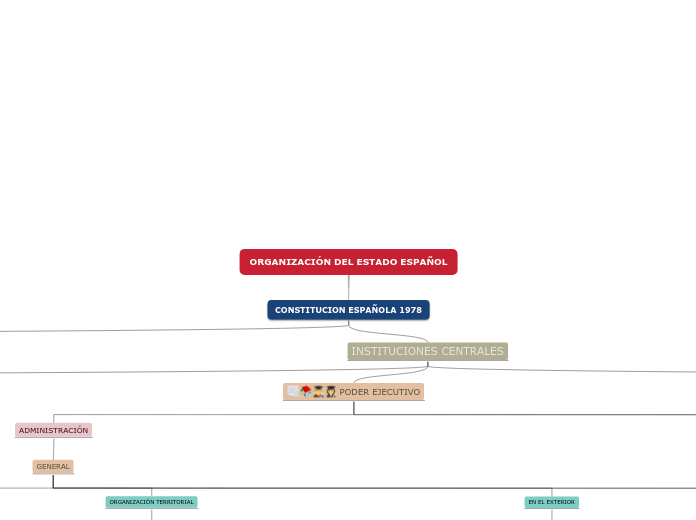por batirtze arenaza 5 anos atrás
830
ORGANIZACIÓN DEL ESTADO ESPAÑOL

por batirtze arenaza 5 anos atrás
830

Mais informações
Type in the name of the multiple-perspectives text.
Example: Bridge to Terabithia by Katherine Paterson
Identify an important issue from the text that is being presented from different angles. Type it in.
Example: Jesse's drawing talent.
El estado se encarga de cuidar y cumplir las leyes de la Constitución.
Aplica justicia a través de la aplicación de leyes y reglamentos.
What kind of narration introduces the viewpoint?
Choose an answer:
El Tribunal Constitucional
Juan José González Rivas Presidente
El Tribunal Supremo
Carlos Lesmes Presidente
Organización de los juzgados y tribunales
Compuesto por jueces y magistrados
Jurisdicción civil, penal, contencioso-administrativa, laboral.
Decide on the second point of view
Name the character (it can either be the main character or one of the supporting characters) whose point of view you are presenting.
Example: Miss Edmunds, Jesse's music teacher.
Aplicar las leyes y gobernar el país.
Type in a quote that points out the character's position about the issue.
Try to follow a citation format: author's name, chapter, and page.
Example: 'She said he was unusually talented, and she hoped he wouldn't let anything discourage him.' (Paterson, 2. 8)
GOBIERNO
Vicepresidentes y ministros
Su número, denominación y competencias están determinados por el presidente.
Los vicepresidentes no son obligatorias.
PRESIDENTE:Pedro Sanchez
How is the viewpoint introduced in the story?
Choose an answer:
Elige los miembros del Gobierno, los dirige y los coordina.
JEFE DEL ESTADO
Felipe VI
Type in a relevant quote that highlights the character's point of view towards
PODER EJECUTIVO.
Try following a citation format: author's name, chapter, and page.
Example: 'Jesse drew the way some people drank whiskey. (...) Lord, he loved to draw. (...) When he was in first grade, he told his father that he wanted to be an artist when he grew up.' (Paterson, 2. 7)
ADMINISTRACIÓN
GENERAL
SECTOR PUBLICO INSTITUCIONAL
Lo forman entidades cuyo objetivo es gestionar actividades reservadas a la administración en materia económica
ADMINISTRACION CONSULTIVA
Consejo económico y social
Emite dictámenes sobre asuntos que el gobierno somete a consulta
Consejo de estado
Expresa su opinión sobre el objeto de la consulta
EN EL EXTERIOR
Representan nuestro país fuera de nuestras fronteras antes otros estados u organismos internacionales.
Dirigen la administración del estado en otros países.
Velan por los intereses de su país en el país anfitrión.
Representantes Permanentes ante Organizaciones Internacionales
Embajadores
Embajada de España en Cuba
ORGANIZACIÓN TERRITORIAL
Órganos directivos
Directores insulares
Dependen del delegado del Gobierno, y ejercen en su ámbito territorial.
Las competencias estan atribuidas a los subdelegados del Gobierno.
Subdelegados del gobierno
Representan al Gobierno en cada provincia
Sus competencias son iguales a las del delegado del Gobierno, pero provinciales.
Delegados del gobierno
Representan al Gobierno en territorios
Sus competencias son dirigir, coordinar, informar a los ciudadanos, proteger los derechos y libertades...
ORGANIZACIÓN CENTRAL
Type in a relevant quote that highlights the character's point of view towards
ADMINISTRACIÓN.
Try following a citation format: author's name, chapter, and page.
Example: 'Jesse drew the way some people drank whiskey. (...) Lord, he loved to draw. (...) When he was in first grade, he told his father that he wanted to be an artist when he grew up.' (Paterson, 2. 7)
Órganos superiores
Secretarios del Estado
Dirigen y coordinan las direcciones generales a su cargo.
Ministros
Están al frente de cada ministerio y son jefes superiores de departamento.
Dirigen los sectores de actividad administrativa integrados en su ministerio.
Ministerios
Órganos directivos.
Subdirectores generales
Responsables de la ejecución de proyectos y actividades en materias especificas, bajo la supervisión de Director General.
Secretarios Generales tecnicos y Directores generales
Tienen competencias sobre la producción normativa, asistencia jurídica y publicaciones.
Subsecretarios y Secretarios Generales
Tienen la representación ordinaria del Ministerio. Inspeccionan los servicios del Ministerio.
Decide on the first point of view you are going to present.
Type in the name of the character (it can either be the main character or one of the supporting characters) whose point of view belongs to.
Example: Jesse Oliver Aarons, Jr., the main character of the novel, a fifth-grader living in a rural Southern area.
Encargados de hacer y reformar leyes.
Type in a relevant quote that highlights the character's point of view towards
INSTITUCIONES CENTRALES.
Try following a citation format: author's name, chapter, and page.
Example: 'Jesse drew the way some people drank whiskey. (...) Lord, he loved to draw. (...) When he was in first grade, he told his father that he wanted to be an artist when he grew up.' (Paterson, 2. 7)
PARLAMENTO
Whose character does the third point of view belong to?
Type in his/her name.
Example: Mr. Aarons, Jesse's father.
What does the character think, say or do that suggests their perspective on the issue?
Type in a quote and try to maintain the citation format.
Example: 'He would like to show his drawings to his dad, but he didn't dare. (...) He'd thought his dad would be pleased. He wasn't. What are they teaching in that damn school? he had asked.' (Paterson, 2.8)
Lo ejercen las Cortes Generales
Type in a relevant quote that highlights the character's point of view towards
PARLAMENTO.
Try following a citation format: author's name, chapter, and page.
Example: 'Jesse drew the way some people drank whiskey. (...) Lord, he loved to draw. (...) When he was in first grade, he told his father that he wanted to be an artist when he grew up.' (Paterson, 2. 7)
Senado
El Senado de España.
Es la cámara territorial.
Se eligen por la población
265 miembros.
Congreso
What type of narration introduces the viewpoint?
Choose an answer:
El congreso de Diputados de España.
Es la cámara baja que representa a la nación.
Preguntas y interpretaciones
Moción
Cuestión de confianza
Control sobre el Gobierno
Moción de censura
Estado democratico
Estado de derecho
Monarquia parlamentaria
Estado autonomico
Justicia
Igualdad
Pluralismo politico